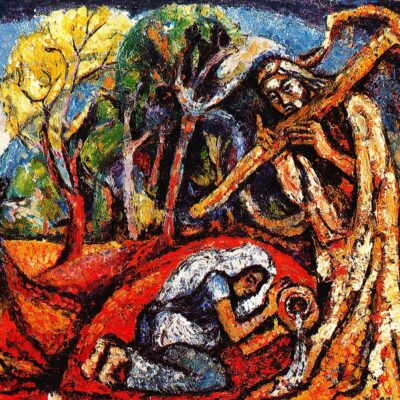One of my favorite cartoons depicts the heavenly throne in the clouds with a newly arrived soul who has just come through the pearly gates. The newest saint has a look of astonishment on his face as he gazes upon the figure who is seated on the throne, bathed in light, dressed in a royal robe and wearing a crown. From the throne the blessed one with tail wagging and ears perked up says, “The joyful, loving, eternally forgiving nature of dogs never tipped you off?”
After all, we all know that dog is just god spelled backwards!
Visions of heaven and hell are not just good material for cartoonists. In every century, in every society there are stories and art that provide metaphors, imagery and language for the afterlife. And since none of us can or ever will know what lies after death and the grave, there is no way to “fact check” any of this material.
The cartoon vision of St. Peter at the pearly gates cannot be found in Scripture. The notion of a personal devil with a forked tail and pitchfork isn’t described in the Bible. Most of us understand that there is no location called “heaven” somewhere above in the clouds, particularly since our spinning planet in our circling solar system has no reference point for up or down!
When we read the Old and New Testaments, we are given a wealth of different depictions of the afterlife, most of which are primarily a commentary on life as it is lived here on earth.
Today we hear another parable from Jesus about a dramatic reversal of expectations. Jesus uses the language and imagery of the afterlife to call into question the assumptions of his audience. Did you notice who is mentioned in the parable? There is a rich man. The trappings of first century wealth weren’t fancy cars and expensive jewelry. We know he’s rich because he wears the very rare and expensive color, purple made from indigo and dresses in linen, which is the finest cloth of his time. In addition, he never goes hungry and eats a lavish feast every day of the year.
Interestingly, although we don’t know the name of this fabulously wealthy man, we do know that the poor man is called Lazarus, not the same Lazarus that Jesus raises from the dead, but one that Jesus must have known well because he describes him in detail. He has no home but instead sleeps in front of the door to the rich man’s home. He’s hungry and sick, covered in sores. Lazarus dies an early death from exposure, starvation and lack of care.
So far there is nothing unusual in this tale. It has been repeated the world over and we can see it unfolding on our own doorsteps. It’s the story that 60 Minutes will cover when they broadcast their piece on Homelessness in Seattle in a few weeks.
What makes Jesus’s parable unique is the presence of the third character. After death both the rich man and Lazarus encounter Abraham, the patriarch of the Jewish faith. It’s Abraham who comforts Lazarus and instructs the rich man. It’s Abraham that points to Moses and the Hebrew prophets as more than adequate teaching on the perils of ignoring the poor and failing to care for the helpless.
After all, Jesus’s audience for this parable are the Pharisees, Jewish religious leaders and examples of holiness. Just a few verses earlier, they are described as lovers of money. They ridicule Jesus when he tells them “You cannot serve God and wealth.” They may have believed, as many still do, that wealth and success are signs of God’s favor and that the poor choose or deserve their lowly status because of character flaws like laziness, criminality, stupidity or weakness.
This shocking parable is a dire warning to those who rely on money and status to justify themselves and who ignore those beloved of God, the poor and needy. It is not primarily a parable of what the afterlife will be like. It is not an actual depiction of some kind of hell or heaven. It is, instead, a dramatic pulling back of the veil we hide behind when we turn away from desperate economic inequality. It is condemnation of a society where daily the poor are left to lie in doorways, on the street, in filthy encampments bearing open wounds and without adequate care.
If you’ve been hanging out in church with Luke’s gospel over the past few weeks, you have heard a series of dramatic reversals from what is expected. Jesus is turning all our common wisdom on its head. In the parables of the lost sheep, coin and son, the God figure is more concerned with the one who is lost than all the obedient, careful rule followers. In the parable of the unjust steward, the God figure is more concerned with forgiveness than fairness, with right relationship than right accounting. And in today’s parable, those who have been abandoned, neglected and despised while alive are most highly valued in God’s economy.
Let me be clear. It’s not the rich man’s wealth that ultimately gets him into trouble. It’s his failure to listen to God in the words of the law and prophets. According to Abraham, he wouldn’t even listen if one were raised from the dead. He has chosen to rely on wealth rather than God, to love money and use people rather than the other way around.
And it’s not the righteousness of Lazarus that brings the favor of Abraham. We don’t know anything about his character. All we know is that he is desperate in this life and beloved in the afterlife. In the parable of Lazarus and the rich man, Jesus continues to fulfill his promise to “preach good news to the poor.” He demonstrates the Old Testament principles that show God’s preferential option for the poor and disadvantaged. He gives hope to those who have been forsaken on this earth with the promise of Paradise. Jesus sees the poor as God sees all those who are broken down by life’s circumstances. His economy is in opposition to the world’s.
Wealth is a completely arbitrary standard for favor or success. Those who measure their lives by it never have enough and those for whom wealth has lost its power will always be content. When wealth is the dominant driver, we have to turn our eyes away from the poor and ignore the needy. When we find ourselves in right relationship to God and God’s gifts we are able to open our hands in generosity.
Sometimes we catch glimpses of God’s kingdom and God’s economy. This past week we held the Edible Hope Kitchen fundraiser. Looking around the sold out event, I saw people from every walk of life, housed and unhoused, rich and poor, young and old, churched and unchurched. We all shared the same meal. We all shared a common mission of creating a community where everyone is fed and cared for. If you weren’t able to come or couldn’t hear well, I’d like to share with you some of what Jess said about her experience as a guest at Edible Hope Kitchen.
Jess became homeless after a terrible car accident in which her fiancé was killed and she was badly disabled. Over time she lost housing, job, memories and all her money. She continues to struggle to get her life back and to remain safe while living on the streets. What she loves most about the daily breakfasts at Edible Hope is the community. When she comes here, she is valued, she is noticed, she is part of a group of people who she cares about and who care about her. Someone checks in with her to see how she’s doing. She feels seen and loved and she is able to offer her love and care to others.
No one is so poor that they don’t have something to offer and gifts to share. No one is so poor that they are without value or purpose. Conversely, no amount of money can secure your soul or prevent loneliness, unhappiness and purposelessness.
Jesus’s vision of the Kingdom is one where all are fed, all are loved, all are valued. If we listen to Moses and the prophets, if we pay attention to the one who is raised from the dead, we can live in that reality even now. Like this past Monday night at Lagunitas, we can experience Beloved Community, which is joyful, loving and eternally forgiving. Amen.



